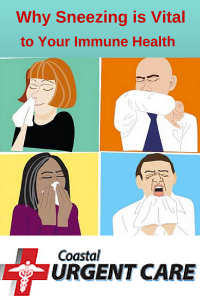FACT: Sneezing is vital to your immune health.
 HOW IT WORKS: When the sensors in your nose get irritated, your body automatically tries to clear your airways of bacteria and viruses. The nerve endings in your nasal passageways detect an irritant and signal the cilia—tiny, hairlike paddles that line our nostrils and sinuses— to expel the irritants. This irritant might be an dust, odd smell, pet dander, pepper, viruses that attack the mucous membranes or a variety of other substances.
HOW IT WORKS: When the sensors in your nose get irritated, your body automatically tries to clear your airways of bacteria and viruses. The nerve endings in your nasal passageways detect an irritant and signal the cilia—tiny, hairlike paddles that line our nostrils and sinuses— to expel the irritants. This irritant might be an dust, odd smell, pet dander, pepper, viruses that attack the mucous membranes or a variety of other substances.
Between colds, allergies, and the millions of random things floating around, your nose stays very busy.
Once your nerves are alerted, they carry these impulses to the sneezing center in your lower brain stem. The sneezing center sends it signals to your facial nerve and the nerves that lead to your lungs and diaphragm. Your eyes start to water, and your nasal passageways secrete fluid. Your diaphragm moves abruptly, causing you to take a deep breath. Then, it and the muscles in your chest compress sending a blast of air upwards. The opening between your throat and mouth wants no part of it and slams shut. The powerful air, traveling 100 miles an hour, is forced out through your nose in the form of a sneeze.
Surprising facts about sneezing:
- Sunshine can make you sneeze. Its due to light sensitive, which is a genetic trait
- A trip to the gym can make you sneeze. When your mouth and nose dry up, the nose reacts with a drip – making you sneeze
- Sex can cause a sneezing trigger
- You do not sneeze when you sleep. When you rest, so do your nerves
- You can not sneeze with your eyes open
Aside from the interesting (but true facts), there are far more myths that people believe despite doctors and scientist telling us otherwise. Some sneezing myths include: eyeballs popping out if you attempt to keep them open, bacteria traveling 150 feet away, and your heart stopping for a split second.
Sneezing can be both a good and a bad thing. Good for you because your nose is protecting you from unwanted illnesses such as the flu. The bad comes when other people get sick. Your sneeze blast bacterial droplets into the air and onto the skin and tissue of anyone in the vicinity of the sneeze. UNLESS: You take all necessary precautions to take care of yourself and those around you.
Sneezing etiquette :
- Cover your nose and mouth. NOT WITH YOUR HANDS. Its best to sneeze into a tissue of the bend of your arm incase there is not an immediate way to wash your hands or use sanitizer
- Try to avoid outdoor activities on high pollen days
- If you must be around pet dander, use filters in your home
If you find yourself sneezing more than usual and know its not from pepper or your recent fun day of spring cleaning contact Your local Coastal Urgent Care. You can speak with a doctor or come in to assess a possible cold or allergy problem.
